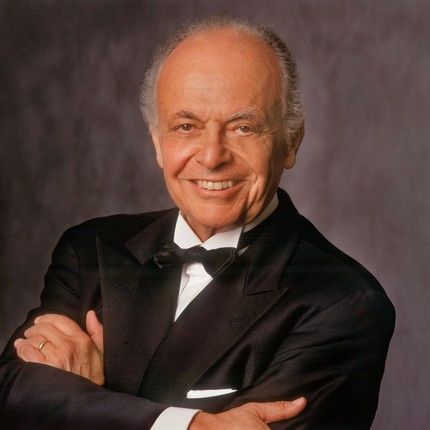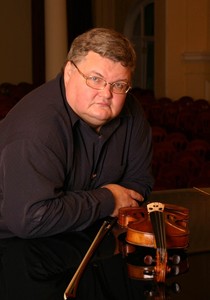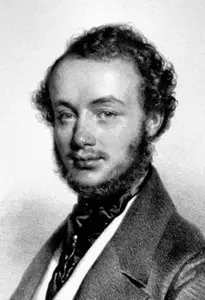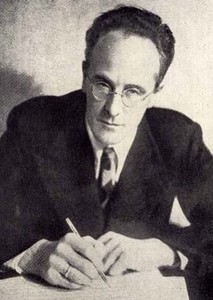
Lorin Maazel (Lorin Maazel) |
Lorin Maazel

Since childhood, he lived in Pittsburgh (USA). The artistic career of Lorin Maazel is truly phenomenal. At thirty he is already a world-famous conductor with an unlimited repertoire, at thirty-five he is the head of one of the best European orchestras and theaters, an indispensable participant in major festivals who has traveled all over the world! It is hardly possible to name another example of such an early take-off – after all, it is undeniable that the conductor, as a rule, is already formed at a fairly mature age. Where is the secret of such a brilliant success of this musician? To answer this question, we turn first of all to his biography.
Maazel was born in France; Dutch blood flows in his veins, and even, as the conductor himself claims, Indian blood … Perhaps it would be no less true to say that music also flows in his veins – in any case, from childhood his abilities were amazing.
When the family moved to New York, Maazel, as a nine-year-old boy, conducted – quite professionally – the famous New York Philharmonic Orchestra during the World’s Fair! But he did not think to remain a semi-educated child prodigy. Intensive violin studies soon gave him the opportunity to give concerts and even, at the age of fifteen, found his own quartet. Chamber music-making forms a delicate taste, broadens one’s horizons; but Maazel is not attracted by the career of a virtuoso either. He became a violinist with the Pittsburgh Symphony Orchestra and, in 1949, its conductor.
So, by the age of twenty, Maazel already had the experience of orchestral playing, and knowledge of literature, and his own musical attachments. But we should not forget that along the way he managed to graduate from the mathematical and philosophical departments of the university! Perhaps this affected the creative image of the conductor: his fiery, irresistible temperament is combined with the philosophical wisdom of interpretation and the mathematical harmony of concepts.
In the XNUMXs, Maazel’s artistic activity began, uninterrupted and ever-increasing in intensity. At first, he traveled all over America, then he began to come to Europe more and more often, to participate in the largest festivals – Salzburg, Bayreuth and others. Soon, surprise at the early development of the musician’s talent turned into recognition: he is constantly invited to conduct the best orchestras and theaters in Europe – the Vienna Symphonies, La Scala, where the first performances under his direction are held with real triumph.
In 1963 Maazel came to Moscow. The first concert of a young, little-known conductor took place in a half-empty hall. Tickets for the next four concerts were sold out instantly. The conductor’s inspirational art, his rare ability to transform when performing music of various styles and eras, manifested in such masterpieces as Schubert’s Unfinished Symphony, Mahler’s Second Symphony, Scriabin’s Poem of Ecstasy, Prokofiev’s Romeo and Juliet, captivated the audience. “The point is not the beauty of the conductor’s movements,” K. Kondrashin wrote, “but the fact that the listener, thanks to the “electrification” of Maazel, watching him, is also included in the creative process, actively entering the world of images of the music being performed.” Moscow critics noted “the complete unity of the conductor with the orchestra”, “the depth of the conductor’s comprehension of the author’s intention”, “the saturation of his performance with the power and richness of feelings, the symphony of thinking”. “Irresistibly affects the whole appearance of the conductor, bewitching with his musical spirituality and rare artistic charm,” the newspaper Sovetskaya Kultura wrote. “It’s hard to find anything more expressive than the hands of Lorin Maazel: this is an unusually accurate graphic embodiment of sounding or just yet to sound music “. Maazel’s subsequent tours in the USSR further strengthened his recognition in our country.
Shortly after his arrival in the USSR, Maazel led major musical groups for the first time in his life – he became the artistic director of the West Berlin City Opera and the West Berlin Radio Symphony Orchestra. However, intensive work does not prevent him from continuing to tour a lot, participate in numerous festivals, and record on records. So, only in recent years he has recorded on records all the symphonies of Tchaikovsky with the Vienna Symphony Orchestra, many works by J. S. Bach (Mass in B minor, Brandenburg concertos, suites), symphonies of Beethoven, Brahms, Mendelssohn, Schubert, Sibelius, Rimsky-Korsakov’s Spanish Capriccio, Respighi’s Pines of Rome, most of R. Strauss’ symphonic poems, works by Mussorgsky, Ravel, Debussy, Stravinsky, Britten, Prokofiev… You can’t list them all. Not without success, Maazel also acted as a director at the opera house – in Rome he staged Tchaikovsky’s opera Eugene Onegin, which he also conducted.
L. Grigoriev, J. Platek, 1969





